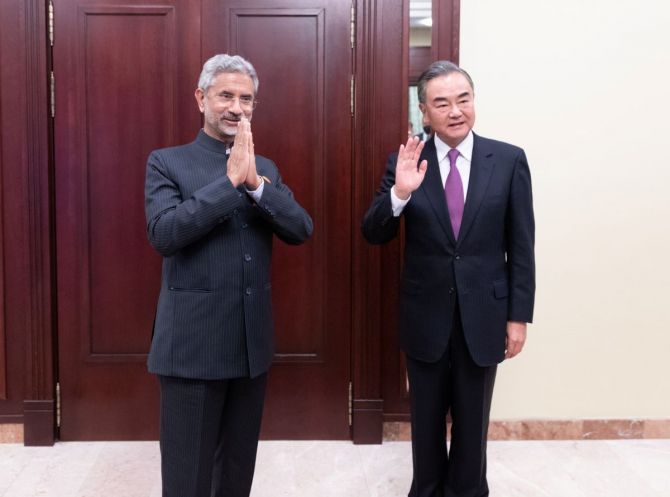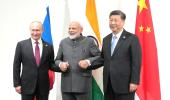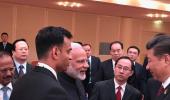The effort made to define the larger picture by focussing on history and the wish not to turn differences into disputes and conflicts is welcome.
In the obtaining circumstances today, nothing more could have been possible, observes Ambassador T P Sreenivasan.

The white smoke that emanated from the Moscow parleys between External Affairs Minister Dr S Jaishankar and Foreign Minister Wang Yi on September 20, 2020 may yet be illusory, considering the distrust between the two countries and the deep Chinese conspiracy which created the incendiary situation along the Line of Actual Control.
But there is reason to believe that India's three-pronged strategy of dialogue, military preparation and economic action has halted Chinese adventurism for the time being.
The roaring of the Rafale jets, the Indian occupation of a few commanding heights on the southern bank of the Pangong Tso, setting up of the barbed wire 'Lakshman Rekha' and the deployment of the Tibetan forces may well have prompted the Chinese to grasp 'the last chance for a peaceful resolution', as they called the Moscow meeting.
Dialogue, Disengagement and Distancing envisaged in the Joint Statement have been promised before, but this is the first time that pen has been put to paper on the subject ever since May 2020 when it all began.
Though it is no guarantee of implementation, an actual document may have a greater chance of success than assurances received in virtual conferences.
The Chinese also have a sense of history of past negotiations, however old they may have been.
A record of the 'frank and constructive discussion' in Moscow with the apparent blessings of Russia and Iran has a chance of implementation, though the text has the potential to be interpreted in different ways.
Significantly, Wuhan and Mamallapuram suddenly made an appearance at a time it appeared that they were thrown to the winds by the Chinese when they planned the incursions.
Prime Minister Modi and President Xi Jinping had appeared to be engrossed in each other and no one believed that those conversations would be in vain.
Modi was accused of misreading Xi even after fifteen meetings with him.
We do not know the nature of the 'consensus' reached between the leaders, but certainly the reset was not to have a bash at each other on the border.
To say that 'the current situation in the border areas is not in the interest of either side' is to acknowledge the obvious.
It is logical, therefore, to continue the dialogue, quickly disengage and maintain proper distance, as the pandemic has taught us to avert danger.
The word 'disengagement' is crucial as the Chinese believe that they have disengaged enough and it is India which has to disengage from the Chushul area.
This determination is as hard as determining the border and the process may go on till the winter and beyond, leaving the situation favourable to the Chinese, who seem to have accomplished their mission already.
We have acquired a few bargaining chips by our action in Chushul, but the Chinese have many more of them along the LAC and that explains their reluctance to agree to restoration of the status quo.
The consensus to abide by all the agreements, including the agreement of 1993 to maintain peace and tranquillity is mandatory and logical, but China is a habitual violator of this obligation and the way it has been written this time is simply a reminder of the violations that have taken place.
Agreements are meant to be followed and not to be flouted.

The agreement to continue the dialogue through the mechanism of the Special Representatives and the Working Mechanism for consultation and coordination is welcome, but without a commitment to move to a time bound programme to conclude these consultations, such an agreement is redundant.
The Chinese seem to consider the negotiations on the border endless till they have sorted out the LAC to their complete satisfaction.
Such a dual path is fraught with dangers as the process of sorting out of the LAC is pure banditry and lawlessness.
The Joint Statement ends with a call to conclude new and undefined Confidence Building Measures, making enhancement of peace and tranquillity in the border areas conditional to the CBMs.
This amounts to a rewriting of the agreement of 1993 and makes violations legitimate in the meantime.
It was feared that the Moscow meeting would end in a fiasco in which China would give an ultimatum to India to withdraw from Chushul and India would insist on restoration of the status quo as in April 2020, leading to a conflict situation.
The Joint Statement has averted such a disaster for the time being.
When India is battling COVID-19 and the looming economic crisis, any respite is welcome and China itself is facing serious international hostility for flexing its muscles in multiple areas.
At best, the Moscow consensus is a breather for the two countries only to be tested in the process of implementation.
China has not given any explanation for its initial moves, though the changes in Jammu and Kashmir and Ladakh have been cited as a possible provocation.
Such a reason, if raised, would be disastrous for India-China relations in the long run.
The present consensus makes it possible to veer away from such a fundamental position and to stay close to the delineation of the border as the core issue.
Scepticism is the prevalent mood in the country and the Joint Statement has many elements in it to make anyone sceptical.
But the effort made to define the larger picture by focussing on history and the wish not turn differences into disputes and conflicts is welcome.
In the obtaining circumstances today, nothing more could have been possible.
At least the vicious circle of Chinese incursion, discussion and partial withdrawal has been broken and attention has turned to long term solutions rather than short term gains.
T P Sreenivasan, (IFS 1967), is a former Ambassador of India and Governor for India of the IAEA.
Ambassador Sreenivasan is a frequent contributor to Rediff.com and his earlier columns can be read here.
Feature Presentation: Aslam Hunani/Rediff.com










